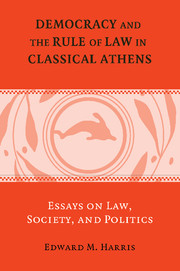Book contents
- Frontmatter
- Contents
- PREFACE
- ACKNOWLEDGMENTS
- ABBREVIATIONS
- INTRODUCTION
- I LAW AND CONSTITUTIONAL HISTORY
- II LAW AND ECONOMY
- III LAW AND THE FAMILY
- 1 Did the Athenians Regard Seduction as a Worse Crime than Rape?
- 2 Did Rape Exist in Classical Athens? Further Reflections on the Laws about Sexual Violence
- 3A Women and Lending in Athenian Society: A Horos Re-Examined
- 3B Notes on a Horos from the Athenian Agora
- 4 The Date of Apollodorus' Speech against Timotheus and Its Implications for Athenian History and Legal Procedure
- 5 A Note on Adoption and Deme Registration
- IV ASPECTS OF PROCEDURE
- V ENVOI
- BIBLIOGRAPHY
- INDEX LOCORUM
- SUBJECT INDEX
3A - Women and Lending in Athenian Society: A Horos Re-Examined
Published online by Cambridge University Press: 25 February 2010
- Frontmatter
- Contents
- PREFACE
- ACKNOWLEDGMENTS
- ABBREVIATIONS
- INTRODUCTION
- I LAW AND CONSTITUTIONAL HISTORY
- II LAW AND ECONOMY
- III LAW AND THE FAMILY
- 1 Did the Athenians Regard Seduction as a Worse Crime than Rape?
- 2 Did Rape Exist in Classical Athens? Further Reflections on the Laws about Sexual Violence
- 3A Women and Lending in Athenian Society: A Horos Re-Examined
- 3B Notes on a Horos from the Athenian Agora
- 4 The Date of Apollodorus' Speech against Timotheus and Its Implications for Athenian History and Legal Procedure
- 5 A Note on Adoption and Deme Registration
- IV ASPECTS OF PROCEDURE
- V ENVOI
- BIBLIOGRAPHY
- INDEX LOCORUM
- SUBJECT INDEX
Summary
πάντα γὰρ δἰ ἀρσένων
γυναιξì πράσσειν εἰκòς, αἵτινες σοφαí
– EuripidesSuppliant Women 40–1the laws of athens granted women few privileges and placed several restrictions on their conduct. Women did not hold public office, vote in the Assembly, serve as members of a court, or bring lawsuits. In financial matters, women were limited to transactions that involved less than the value of a medimnus of barley, an amount just large enough to feed a family for only a week. One might get the impression from this law that women in Athens had very little to do with financial matters and played virtually no role in activities like large-scale lending. But the impression would be a false one. Laws can only prescribe or proscribe certain actions. They do not describe what life was actually like. Of course, the letter of the law, if vigorously enforced, must be observed. Human beings, however, are always capable or finding devices that enable them to subvert the spirit of the law. For instance, the law barring women from transactions involving more than a medimnus of barley was clearly aimed at discouraging women from handling large sums of money. By denying loans made by women the protection of the law, this statute attempted to prevent women from participating in important financial matters, an area that was supposed to remain under the control of husbands and male relatives. Yet we know of several cases where women exerted influence in important decisions concerning money. Though the laws might deprive them of the formal means of exercising power, women could always find informal methods of influencing events.
- Type
- Chapter
- Information
- Democracy and the Rule of Law in Classical AthensEssays on Law, Society, and Politics, pp. 333 - 346Publisher: Cambridge University PressPrint publication year: 2006



